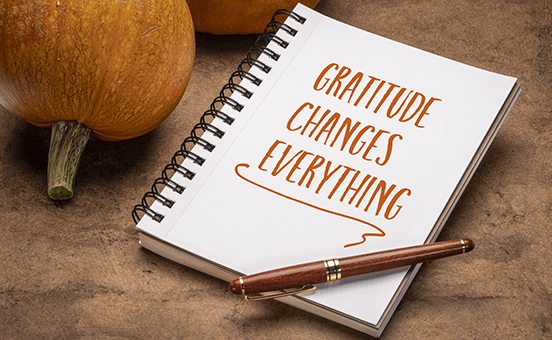November 17, 2021
Happy November!

By Chris Coward, Vice President of Coaching for Apollo Health
Every November, I think about gratitude as we approach Thanksgiving here in the United States. Some of you are familiar with the VIA Character Strengths assessment, one of the oldie but goodie assessments that have come out of positive psychology. In this free, research-based assessment, 24 Character Strengths can help you in many life areas, including improving health and wellness, increasing productivity, managing stress, and improving relationships. If you are interested, you can take the assessment here and find additional learning resources. For example, did you know that there are five character strengths associated with life satisfaction and happiness? They are hope, zest, gratitude, curiosity, and love. When I learned this several years ago, I compared this to my results, which have been consistently high in zest and curiosity, but not so much in gratitude, love, and hope.
I decided to take action to raise my gratitude score. Spoiler alert — it worked! I started a gratitude journal and added a question to my coach prep form for my coaching clients asking what they are grateful for. Even though they were answering this question and not me, reading their responses inspired me to be even more mindful of what I was thankful for. In addition, I received new ideas for which I could be grateful.
When I retook the assessment one year later, my gratitude score moved up from 14 to six, and my full report (there’s a free report and a paid one that has more detail) indicated that the relative strength, on a scale of one to five, was between four and five. I’m now working on my lowest strength, Prudence. Just kidding, I’m not working on this one.
If you are a ReCODE member or a care partner of a loved one following the ReCODE Protocol™, you may find yourself losing your sense of gratitude as you face the challenges of improving cognition or helping someone in this area. Focusing on what is good about your life can switch your perspective and decrease your negative emotions. There are two aspects to gratitude: acknowledging the goodness in your life and realizing that this goodness comes from outside yourself. For example, let’s say I’m a care partner to someone with Alzheimer’s Disease, and one of the three things I’m grateful for on a given day is “my wife ate her dinner without a struggle.” When I focus on how that happened and acknowledge it was a combination of, she was in a good mood and the luck of the draw, I’m experiencing gratitude. On the other hand, if I attribute her behavior at dinner to my exceptional caregiving skills, i.e., I’m the reason for this smooth sailing meal, then I’m not practicing gratitude. While it may be true that you have done something different to get a better outcome (and it’s perfectly fine to acknowledge that, too), it is different from practicing gratitude.
1) Start a gratitude journal: At the end of each day, write down three things that went well and why they went well. Why do this? According to positive psychology research, as humans, we become habituated to what is going well and subsequently lose appreciation for the small things in life. This exercise will help you rebuild your appreciation for what’s going well.
2) If you are not a “journaler,” you can modify the above exercise by either sharing out loud the three good things with a partner or taking time (I like doing this in the shower) each day to focus on the three things that went well and why.
3) Share your appreciation of someone directly to them. Tell them in person or in writing, and be specific about what you appreciate about them.
4) Expanding on #3, write a gratitude letter to someone who has greatly influenced your life. Tell them how they enriched you and what you appreciate about them. Don’t forget to send the letter unless they have passed on.
5) Practice mindfulness in your everyday life. Notice your environment with curiosity while you are outside, including the small details — the song of a bird, the blooming tree, the friendliness of strangers, etc. To strengthen your mindfulness muscle, start or continue a meditation practice. My colleague, Valerie Driscoll, has written several articles on mindfulness that you can review.
My coaching call to action: what small step can you take to increase your gratitude? I wish you the best with your practice.




